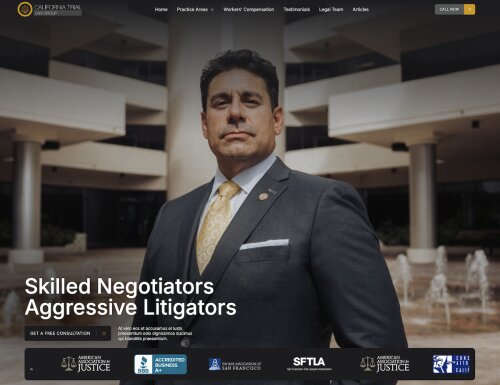Best General Litigation Lawyers in Georgia
Share your needs with us, get contacted by law firms.
Free. Takes 2 min.
Or refine your search by selecting a city:
List of the best lawyers in Georgia, United States
About General Litigation Law in Georgia, United States
General litigation law in Georgia refers to the legal process used to resolve disputes between individuals, businesses, organizations, or government entities in courts of law. These disputes can arise from a wide range of issues, including contracts, property, business relationships, personal injuries, and more. General litigation encompasses both civil and, at times, administrative matters but does not cover criminal proceedings. In Georgia, as in most states, the litigation process involves several stages, such as investigation, pleadings, discovery, settlement negotiations, trial, and, if necessary, appeal. The aim is to resolve conflicts fairly and legally, with the court acting as an impartial decision-maker.
Why You May Need a Lawyer
Legal disputes can be complex, stressful, and time consuming. You may need a lawyer in general litigation cases for many reasons, such as:
- You are being sued or need to file a lawsuit to protect your rights or interests.
- You are involved in a contract dispute, such as a breach, interpretation, or enforcement issue with an individual or business.
- You have suffered property damage or financial loss due to another party's actions or negligence.
- You are dealing with disputes related to real estate, construction, or landlord-tenant matters.
- You need to resolve employment or business disagreements, such as partnership, shareholder, or employment contract issues.
- You require assistance with debt collection, enforcement of judgments, or defending against such actions.
- You want to explore alternative dispute resolution methods, like mediation or arbitration, before heading to court.
- You have received a summons, subpoena, or other official legal notice that requires a response.
- You are unsure of your legal rights or responsibilities in a civil dispute.
A qualified attorney can help you understand your options, represent your best interests, and ensure you comply with court rules and procedures.
Local Laws Overview
Litigation in Georgia is governed by a combination of state statutes, federal laws (when applicable), and rules of civil procedure. Some key aspects particularly relevant for general litigation in Georgia include:
- Georgia Civil Practice Act: The main body of laws outlining the procedural rules for filing and defending lawsuits, found in Title 9 of the Georgia Code.
- Jurisdiction: Georgia has Superior Courts for general civil litigation, as well as State Courts for certain civil cases. The correct court depends on the amount in dispute and the nature of the case.
- Statute of Limitations: Time limits exist for when lawsuits must be filed. For example, most personal injury claims must be filed within two years and written contract disputes within six years.
- Pleadings and Motions: Parties must comply with specific rules for submitting pleadings and motions within set timeframes.
- Discovery: Parties are entitled to obtain information from each other through processes like interrogatories, depositions, and document requests.
- Mediation and Arbitration: Georgia courts often encourage parties to resolve disputes through alternative dispute resolution before proceeding to trial.
- Appeals: Georgia law provides for appeals to higher courts if a party disagrees with a trial court's decision.
Understanding these rules is important to successfully navigating a civil lawsuit in Georgia.
Frequently Asked Questions
What is general litigation?
General litigation is the process of resolving legal disputes between parties in a court of law, including cases related to contracts, property, personal injury, and business issues.
What types of cases fall under general litigation in Georgia?
General litigation includes contract disputes, property damage claims, personal injury cases, business disagreements, real estate conflicts, landlord-tenant issues, and more.
How long do I have to file a lawsuit in Georgia?
The time limit, known as the statute of limitations, varies by case type. For most personal injury cases, you have two years. For written contract disputes, you have six years. Other types may have different deadlines.
Do I need a lawyer for litigation in Georgia?
While you can represent yourself in court, a lawyer provides critical expertise in navigating complex legal rules, court procedures, and negotiating settlements or presenting your case in court.
What is the difference between mediation and litigation?
Mediation is a voluntary process where a neutral third party helps disputing parties reach an agreement. Litigation is a court-based process where a judge or jury renders a decision.
How is a lawsuit started in Georgia?
A lawsuit begins when the plaintiff files a complaint with the appropriate court and legally notifies the defendant through service of process.
What can I expect during the discovery phase?
During discovery, both parties exchange relevant information and evidence through written questions, document requests, and depositions, allowing both sides to prepare for trial.
Can my case be settled without going to trial?
Yes, many cases in Georgia are resolved through negotiations, mediation, or settlement discussions before reaching trial.
What happens if I lose my case?
If you lose your case, you may be required to pay damages, court costs, or attorney fees. You may have the right to appeal the decision to a higher court.
How much does general litigation cost?
Costs vary depending on case complexity, court fees, expert witness fees, and attorney rates. Many lawyers offer free initial consultations to discuss potential fees and expenses.
Additional Resources
If you need more information or support regarding general litigation in Georgia, consider these resources:
- State Bar of Georgia - Offers lawyer referral services, legal information, and assistance for the public.
- Georgia Superior Courts - Handles most general civil litigation matters.
- Georgia Legal Services Program - Provides free or low-cost legal aid for qualifying individuals.
- Georgia Department of Law (Attorney General) - Offers consumer guidance and public resources.
- Local county law libraries - Provide access to statutes, case law, and self-help materials.
Next Steps
If you are considering legal action or have been served with legal papers in Georgia, take these steps:
- Gather all documents and information related to your dispute, such as contracts, correspondence, and evidence.
- Determine the deadline for filing or responding to legal actions to protect your rights.
- Consider scheduling a consultation with a qualified Georgia litigation attorney for advice tailored to your situation.
- Ask the attorney about your legal options, potential outcomes, and estimated costs.
- Follow all court procedures and deadlines if you choose to proceed on your own, but remember that a lawyer can greatly increase your chances of a favorable result.
- Keep copies of all documents filed with the court and all correspondence regarding your case.
Prompt action and informed decision-making are crucial in general litigation matters. If you have additional questions, consider reaching out to local legal aid resources or consulting with an experienced attorney.
Lawzana helps you find the best lawyers and law firms in Georgia through a curated and pre-screened list of qualified legal professionals. Our platform offers rankings and detailed profiles of attorneys and law firms, allowing you to compare based on practice areas, including General Litigation, experience, and client feedback.
Each profile includes a description of the firm's areas of practice, client reviews, team members and partners, year of establishment, spoken languages, office locations, contact information, social media presence, and any published articles or resources. Most firms on our platform speak English and are experienced in both local and international legal matters.
Get a quote from top-rated law firms in Georgia, United States — quickly, securely, and without unnecessary hassle.
Disclaimer:
The information provided on this page is for general informational purposes only and does not constitute legal advice. While we strive to ensure the accuracy and relevance of the content, legal information may change over time, and interpretations of the law can vary. You should always consult with a qualified legal professional for advice specific to your situation.
We disclaim all liability for actions taken or not taken based on the content of this page. If you believe any information is incorrect or outdated, please contact us, and we will review and update it where appropriate.
Browse general litigation law firms by city in Georgia
Refine your search by selecting a city.
















